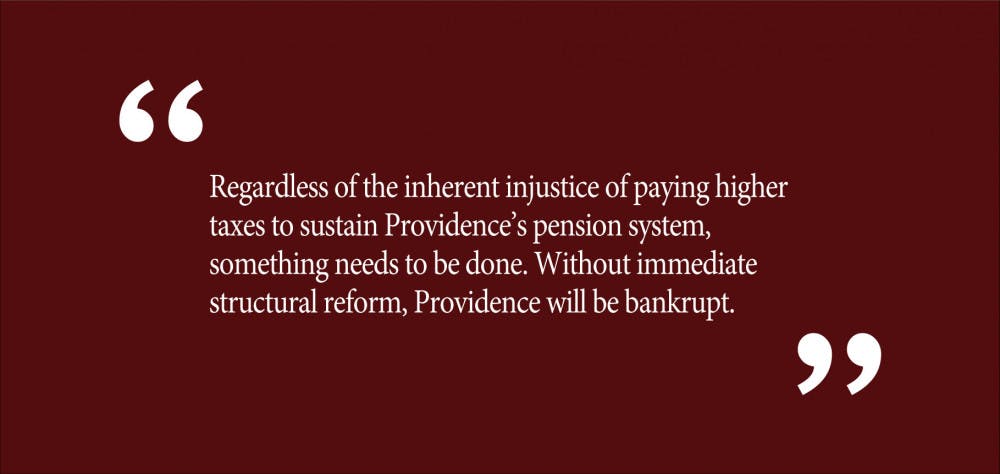Even as Washington intrigue dominates media coverage of our government, American cities continue to define how citizens interact with the institutions around them — with consequences that the public often misses or overlooks. Indeed, a little known yet destructive trend is brewing in city pension funds across the United States.
For decades, local government workers across the country have sent a portion of their paychecks to the municipalities that employ them; cities combine these payments with their own annual contributions, invest the money and pay it out to these employees once they reach retirement age. It is under this system that cities have guaranteed financial security to generations of police, teachers and bureaucrats who help run America. But today, those pension funds are running dry as a result of mismanagement, corruption and a dearth of funding. Look no further than Providence, Rhode Island for a case study in such a pension puzzle and for evidence of the danger they pose to middle class livelihoods.
The city has suffered from deep-rooted mismanagement of its pension system. Rosy expectations about investment returns and decades of inadequate contributions to the fund — the city came up $16 million short in 1999 alone — have left it just a quarter of the way toward covering the $1.3 billion it owes to current and future retirees.
Such numbers are mind-boggling in and of themselves, but the budget pressure they create reveals an acute crisis with a concrete human impact. A 2010 refinancing scheme demands 3.5 percent yearly increases in Providence’s annual contributions to its pension system, outpacing the 2 percent rate at which the budget grows overall. This means that pension liabilities could edge out priorities like other social spending and infrastructure. This would be catastrophic for a public school system defined by chronically absent teachers, for the 70 percent of Rhode Island streets in poor condition and for a city with the highest poverty rate in the Northeast.
The difficult choices that pension reform requires — which can include tax hikes, slimmer pension payouts and more limited provision of local government services — make it extremely unpopular. Yet, in the face of a budget disaster that Providence’s mayor, Jorge Elorza, claims could cause bankruptcy for the whole city in 12 years, policy changes are necessary. First, the system of employee contribution and retiree payouts must become more sustainable. For instance, city employees currently contribute around 8 percent of their paychecks to pension funds. Even a modest 2 percent increase in that number could eliminate as much as 10 percent of the funding gap that the municipality faces. Similarly, key fixes on the retirees’ end could take pressure off the cash-strained city government. Simply reducing payouts on the largest pensions — those whose retirees are afforded over $2,000 a month — by 5 percent would cut the city’s annual retired contribution to the pension fund by $4 to $6 million.
But while sustainable support for retirees is important, Providence also needs more revenue if it hopes to avert this crisis. Nonprofits, such as universities and hospitals, do not pay property taxes despite owning 40 percent of city land. They should pay a greater share of government revenue. Former Providence mayors David Cicilline and Angel Taveras attempted to implement property taxes on nonprofits, but these attempts were unpopular and unsuccessful.
Since 2012, when then state treasurer Gina Raimondo raised the alarm about Providence’s broken pension system, middle-class Rhode Islanders who organize their lives around these pension payments — cops, firefighters and teachers — have been outraged, and for good reason. They consider it unfair that citizens should have to pay the price for decades of corruption, poor governance and financial mismanagement in City Hall. In the face of broken promises and burdensome demands from state officials, they are right.
Yet what these complaints miss is that, regardless of the inherent injustice of paying higher taxes to sustain Providence’s pension system, something needs to be done. Without immediate structural reform, Providence will be bankrupt. Bankruptcy would be a disaster for the city, leaving it unable to finance services as basic as law enforcement, and deterring enterprising Americans from opening businesses there.
Both types of reform — restructuring payments and finding new sources of revenue — though unpopular and austere, are necessary. Providence’s financial woes hold no panacea, and fixing them will require people across the socioeconomic spectrum to make financial sacrifices. In a crisis that threatens the entire city, there is no way around the tough choices that Providence’s citizens must make.
Arjun Shanmugam ’23 can be reached at arjun_shanmugam@brown.edu. Please send responses to this opinion to letters@browndailyherald.com and op-eds to opinions@browndailyherald.com.





